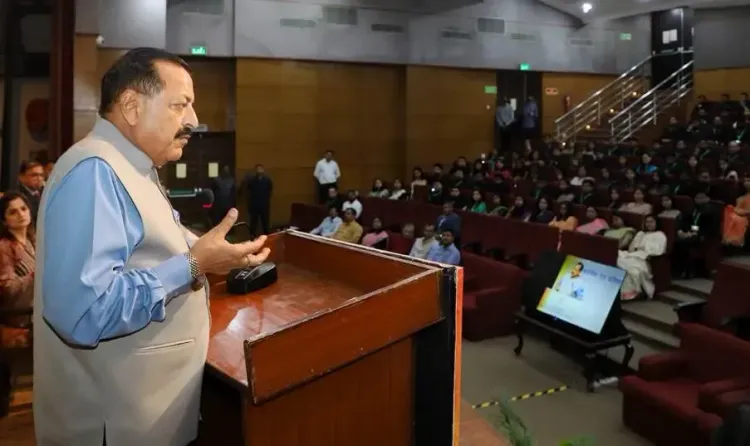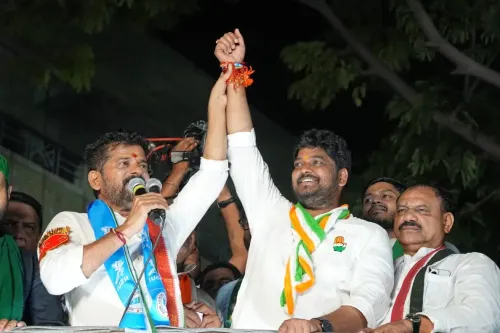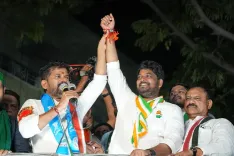2023 IAS Batch Achieves Record Women Representation: Jitendra Singh

Synopsis
Key Takeaways
- 2023 IAS batch has 41% women representation.
- Assistant Secretary programme enhances governance exposure.
- Technocrats are now seen as valuable in civil services.
- CPGRAMS platform resolves grievances effectively.
- Emphasis on human empathy in governance.
New Delhi, April 20 (NationPress) In an inspiring and enlightening session with the Officer Trainees (OTs) of the 2023 IAS batch, Dr Jitendra Singh, Union Minister of State for Personnel, Public Grievances and Pensions, celebrated the unprecedented representation of women in Indian Administrative Services, with 74 women officers comprising 41 percent of the current batch of 180 officers.
The session was part of the ongoing Assistant Secretary programme, where IAS Officer Trainees are linked to 46 Central Ministries for a duration of 8 weeks from April 1 to May 30, 2025, providing them early insights into policy development and the operations of the Central Government.
Dr Jitendra Singh attributed this significant milestone to the visionary leadership of Prime Minister Narendra Modi, under whose administration women-led initiatives have gained remarkable traction. “The Prime Minister has consistently advocated for women empowerment. This record representation reflects his steadfast commitment to inclusive and progressive governance,” the Minister stated.
The Minister reminisced about the launch of the Assistant Secretary Programme in 2015, describing it as Prime Minister Modi’s initiative to provide young officers with real-time governance exposure at the onset of their careers. “The programme has revitalized confidence among officers. During the pandemic, many of these officers excelled when tasked with district-level crisis management,” he remarked.
As the programme commemorates its 10th anniversary, the Union Minister acknowledged its profound impact on cultivating capable and confident civil servants. He also applauded the democratization of Civil Services, with growing representation from regions such as Punjab, Haryana, and the North-East, areas that previously saw limited selections.
The Minister expressed pride in the academic and professional variety within the batch, noting that 99 officers come from engineering disciplines, alongside many from medical and other technical sectors. “For years, I pondered why technocrats pursued civil services. Now, I recognize that the technical nature of flagship Government initiatives—ranging from Digital India to Smart Cities—renders their involvement a national advantage,” he explained.
Dr Singh commended the young average age (between 22-26 years) of the batch, which offers a lengthy career path for contributing to the nation. He encouraged the officers to stay technologically savvy and fully utilize the iGOT Karmayogi platform, a digital learning ecosystem providing continuously updated training modules.
“You are privileged to be in an era where India is swiftly advancing towards becoming Viksit Bharat @2047,” he emphasized.
During an open dialogue with the young officers, Dr Singh advocated for a more flexible civil service environment, where officers could gain experience outside government before returning as domain experts—a model he described as “a win-win for both the officer and the government.”
Addressing the topic of narrowing the digital divide, the Minister referred to technology as a great equalizer, citing initiatives like the Swamitva Mission, which eliminates the necessity for revenue officials through drone-based property mapping. “This has democratized access to land records and decentralized service delivery at the grassroots level,” he stated.
Dr Singh also underscored the significance of grievance redressal systems, urging the trainees to familiarize themselves with the CPGRAMS platform, which he characterized as a global standard. “Approximately 26 lakh grievances have been resolved with a 98 percent resolution rate, most within 13 days,” he shared.
However, he reminded the officers that human intelligence and empathy should complement technology. “Even with technical grievance resolutions, many citizens still experience emotional dissatisfaction. Hence, we have established a ‘human desk’ to provide emotional closure, demonstrating that governance transcends administrative tasks and is deeply human,” the Minister noted.
In a poignant moment, one of the Officer Trainees referenced Dr Singh’s previous speech, “One retires from service, not from citizenship.” In response, the Minister discussed initiatives to engage retired civil servants through a Digital Repository of Expertise, enabling India to leverage their knowledge. He also highlighted the Anubhav Awards, which motivate retiring officers to document their experiences for the benefit of future generations.
As the interaction drew to a close, Dr Singh urged the young civil servants to uphold the highest principles of integrity, accountability, and service, aligning their efforts with the spirit of Antyodaya—working for the last individual in line.
“This IAS officer batch is not only the youngest and most diverse— but also the most representative of New India's aspirations. Let your efforts mirror the hopes of a billion citizens,” asserted the Minister.









